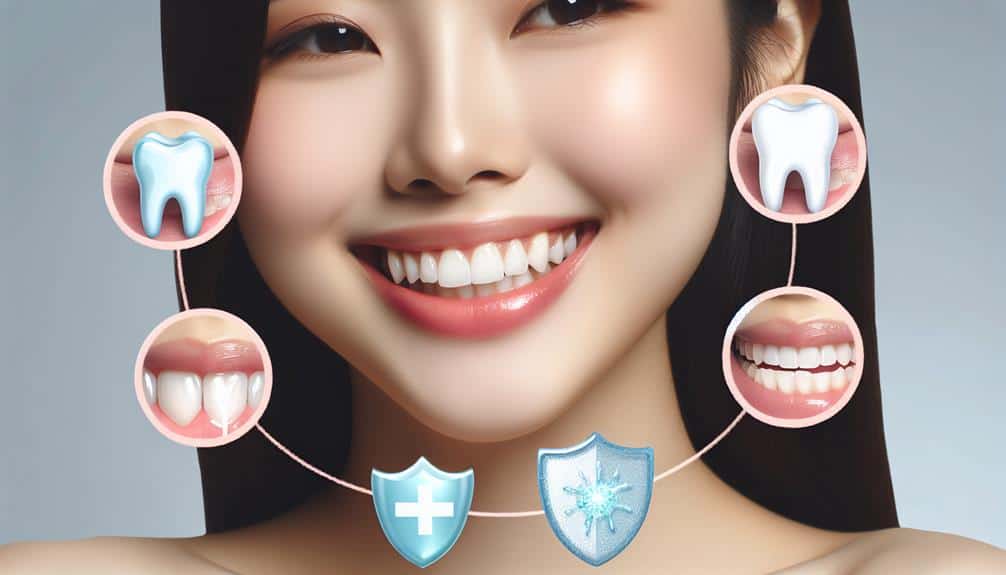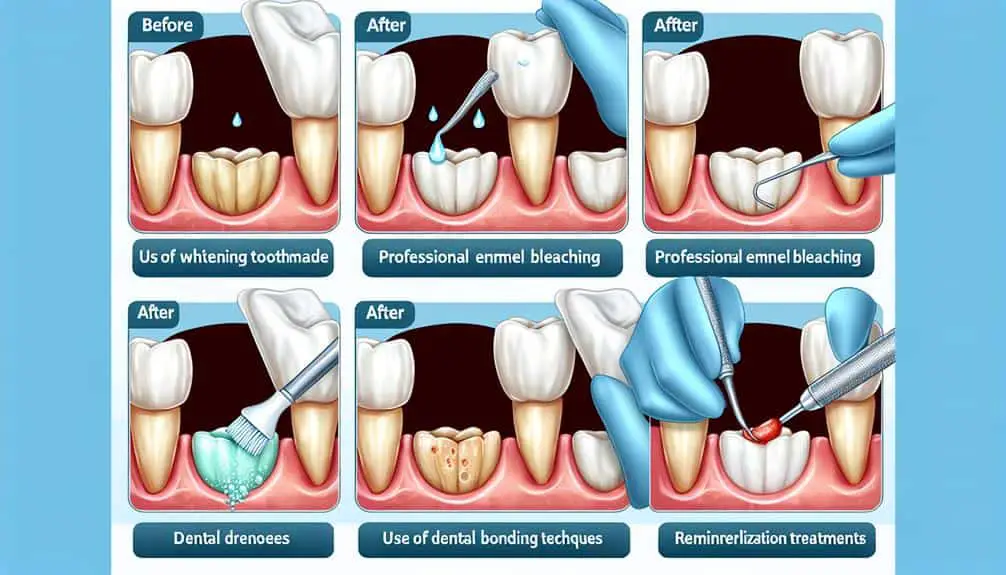To safeguard your enamel while whitening your teeth, focus on enamel-strengthening treatments and products with enamel-friendly ingredients like fluoride or potassium nitrate. Prioritize enamel health by choosing low abrasion formulas and consulting dental professionals for tailored non-abrasive options. By emphasizing enamel protection in your whitening routine, you can achieve a brighter smile while maintaining your oral health.
Key Points
- Prioritize enamel health with gentle whitening techniques using fluoride or calcium phosphate.
- Consult dental professionals for safe whitening options tailored to your enamel condition.
- Choose enamel-friendly products with essential minerals like calcium and phosphate.
- Opt for non-abrasive formulas containing fluoride and hydroxyapatite for enamel protection.
- Use enamel-repairing products recommended by professionals to prevent further damage.
Enamel-Safe Whitening Options
Looking to whiten your teeth without causing damage to your enamel? Enamel strengthening is essential when contemplating safe teeth whitening options. Natural remedies offer a gentle approach to brightening your smile without compromising the integrity of your enamel.
One effective method is oil pulling with coconut oil. Research suggests that the lauric acid in coconut oil can help reduce plaque and fight harmful bacteria in the mouth, promoting enamel health while gradually removing surface stains.
Another natural remedy to ponder is baking soda. Its mild abrasiveness can help remove stains without eroding enamel when used in moderation. Baking soda also has antibacterial properties that can contribute to overall oral health. Additionally, consuming crunchy fruits and vegetables like apples and carrots can aid in naturally scrubbing away surface stains while providing essential nutrients for enamel remineralization.
Non-Abrasive Whitening Techniques
To achieve a brighter smile without causing enamel damage, consider exploring non-abrasive whitening techniques that prioritize enamel health and safety. Non-abrasive methods can effectively whiten teeth without compromising the integrity of the enamel.
Here are some strategies to guide you towards safe teeth whitening:
- Enamel Strengthening Treatments: Look for whitening products that not only whiten but also strengthen the enamel. Ingredients like fluoride and hydroxyapatite can help fortify the enamel while brightening your smile.
- Enamel Friendly Ingredients: Opt for products that contain enamel-friendly ingredients such as potassium nitrate or calcium phosphate. These ingredients are gentle on the enamel, ensuring that your teeth aren't compromised in the whitening process.
- Low Abrasion Formulas: Choose whitening products with low abrasiveness to prevent unnecessary wear and tear on the enamel. Mild formulas can effectively remove stains without harming the enamel.
- Professional Guidance: Consult with a dental professional to explore non-abrasive whitening options tailored to your specific enamel health needs. Dental experts can recommend safe and effective whitening techniques that prioritize enamel protection.
Enamel-Repairing Whitening Products
Consider incorporating enamel-repairing whitening products into your oral care routine to enhance the health and appearance of your teeth. Enamel plays an essential role in protecting your teeth from decay and sensitivity, so it's important to maintain its strength. Look for enamel strengthening formulas or enamel rejuvenating products that not only whiten your teeth but also promote enamel health. These enamel friendly treatments can help repair minor damage and prevent further deterioration.
Enamel boosting techniques work by replenishing essential minerals such as calcium and phosphate, which are necessary for enamel health. Products containing fluoride can also aid in remineralization and strengthen the enamel structure. When choosing enamel-repairing whitening products, opt for those recommended by dental professionals or carry the American Dental Association (ADA) seal of acceptance to ensure their effectiveness and safety.
Gentle Whitening Solutions
Replenish your enamel and brighten your smile with gentle whitening solutions designed to promote oral health and enhance the appearance of your teeth. When seeking safe teeth whitening options, consider natural alternatives that offer gradual results to safeguard your enamel while effectively whitening your teeth.
- Patience is Key: Gentle whitening solutions may take longer to show results compared to harsher alternatives, but the gradual process helps maintain the health of your enamel.
- Enamel Protection: Opt for whitening products that prioritize enamel protection, such as those containing fluoride or calcium phosphate, to strengthen your teeth while whitening them.
- Natural Ingredients: Look for whitening solutions that utilize natural ingredients like baking soda, activated charcoal, or hydrogen peroxide in safe concentrations to avoid enamel damage.
- Consultation with a Professional: Before starting any whitening regimen, consult with a dental professional to safeguard the chosen method is suitable for your oral health needs and to monitor progress effectively.
Enamel-Protecting Whitening Methods
For safeguarding your enamel while achieving a brighter smile, explore enamel-protecting whitening methods that prioritize oral health.
When seeking enamel-protecting whitening methods, consider options that incorporate enamel strengthening treatments and enamel-friendly kits. These treatments aim to not only whiten your teeth but also support the health and resilience of your enamel.
Look for products with enamel protective ingredients and enamel-preserving formulas to make certain that your teeth whitening journey is gentle yet effective. Enamel-friendly kits are designed to minimize enamel erosion and sensitivity while still delivering noticeable whitening results.
By opting for products with enamel-protective properties, you can maintain the integrity of your enamel while enhancing the appearance of your smile. Prioritizing enamel health in your teeth whitening routine is crucial for long-term oral health and overall well-being.
Make informed choices when selecting whitening products to safeguard your enamel and achieve a radiant smile without compromising on oral health.
Frequently Asked Questions
Can Teeth Whitening Treatments Cause Enamel Damage Over Time?
Teeth whitening treatments can potentially damage enamel over time if not done correctly. Protect enamel by using professional whitening techniques and opting for options that promote long-term enamel health. Consult a dentist for safer whitening options.
Are There Any Natural Remedies for Whitening Teeth That Are Safe for Enamel?
For safe enamel health, explore natural remedies as safe whitening alternatives. Options like baking soda, hydrogen peroxide, and activated charcoal can help whiten teeth while protecting enamel. Prioritize enamel protection with these solutions.
How Long Do the Effects of Enamel-Repairing Whitening Products Last?
To maintain enamel protection and longevity, enamel-repairing whitening products typically last for a few months. Consistent use, along with good oral hygiene practices, can help prolong whitening effects while safeguarding enamel health.
Is It Possible to Over-Whiten Teeth and Harm Enamel Despite Using Gentle Whitening Solutions?
To safeguard your enamel while whitening, monitor excessive use of mild solutions. Expert guidance guarantees secure practices. Balance whitening methods for enamel health. Avoid damage by comprehending the limits of whitening on enamel.
Are There Any Specific Foods or Drinks to Avoid After Teeth Whitening to Prevent Enamel Damage?
After teeth whitening, avoid acidic foods like citrus fruits that can harm enamel. Opt for enamel-friendly snacks like cheese or crunchy vegetables. Drink water or milk instead of acidic post-whitening beverages to protect your teeth.



